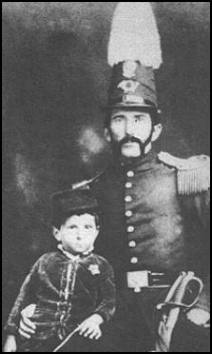 Patrick
Edward Connor commanded the Stockton Blues of the California
Militia at the outbreak of the Civil War. He quickly recruited
the Blues to regimental strength and was appointed colonel, 4
September 1861. The regiment and two companies of the 2d California
Cavalry were immediately ordered to Utah Territory to protect
the Overland Stage and Pacific Telegraph rights of way, and to
act as a force of observation in order to forestall any joint
activity between Mormon recalcitrants and Southern sympathizers
seeking to secure the Southwest for the Confederacy.
Patrick
Edward Connor commanded the Stockton Blues of the California
Militia at the outbreak of the Civil War. He quickly recruited
the Blues to regimental strength and was appointed colonel, 4
September 1861. The regiment and two companies of the 2d California
Cavalry were immediately ordered to Utah Territory to protect
the Overland Stage and Pacific Telegraph rights of way, and to
act as a force of observation in order to forestall any joint
activity between Mormon recalcitrants and Southern sympathizers
seeking to secure the Southwest for the Confederacy.
